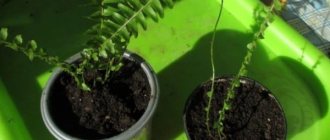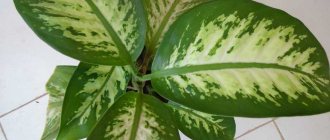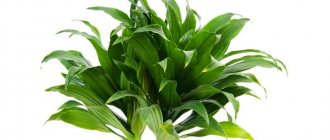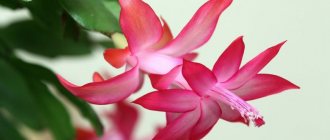- August 12, 2019
- Houseplants
- Daniil Belousov
Aloe is an ornamental plant that is distinguished by very fleshy and thick leaves. It is widespread in African countries. However, everyone knows it under the name agave, since it grows in almost every home. Many people are familiar with the amazing healing properties of this plant. But like any other, it needs proper nutrition, lighting and watering. Therefore, let's look at the features of aloe vera. How to care for this unique plant at home?
Lighting
It is immediately worth noting that this plant is very demanding of light. Therefore, it is best to place it on the sunny side. This is especially true for the cold season. During this period, you need to periodically move the aloe to the most illuminated points of the apartment. If there is not enough sunlight in the room, then in this case the plant will have to be illuminated using artificial lighting.
During the hot season, it is recommended to place aloe on the balcony, or even directly outside. In this case, the plant will happily enjoy direct sunlight. This is one of those plants that is not afraid of sunlight. Since its leaves are filled with a jelly-like mass, the sun’s rays cannot damage the hard peel.
Watering
If we talk about how to care for aloe, the description in any specialized literature will contain information that you do not need to “water” this amazing plant abundantly and often. Moreover, it is better not to water the aloe once again than to add too much moisture to the soil.
In the cold season, the flower is moistened as needed when the soil dries out. Moreover, for watering it is recommended to use dispersive sprinklers. When the warm season begins, aloe is watered every day. However, the procedure is performed exclusively through the pallet. That is, water is not poured directly to the roots, but only into the pot stand. It is also worth paying attention to the fact that it is recommended to first pour water into the tray and then wait 20-30 minutes. If there is anything left in it, the liquid is drained. In this case, you can avoid the fact that the soil will take more moisture than it needs.
Special aloe vera flower
What is unique and useful about the aloe succulent? Caring for a growing plant at home allows you to always have an assistant in the fight against germs, fungi and bacteria.
Aloe vera has an antibacterial and disinfectant effect. You just need to apply the gel to your palms and rub. Germs and dirt will be destroyed by the plant sap.
You can use aloe vera succulent as an effective vegetable and fruit wash, it is a true natural product without chemicals.
Aloe vera flower is rightfully considered a natural analgesic and the first aid for skin damage.
Content temperature
How to care for aloe? If we talk about temperature conditions, it is best to install the flower on a window on the south or east side. In this case, the plant will not be able to freeze and at the same time receive the greatest amount of light. When it gets cold, be sure to place the pot on the warmest window. Care must be taken to ensure that the temperature does not drop too low. Otherwise, the aloe will stop blooming and developing. Since this plant originated in Africa, this means that it is dependent on sunlight, and therefore on heat. Nevertheless, home room temperature is quite enough for this flower.
If we talk about the minimum permissible temperature in the room, then for aloe in a pot it is +15 degrees. It is undesirable for it to go lower. If the plant begins to freeze, the foliage will become more lethargic and lifeless.
If it is a cold winter, then in this case it is recommended first of all to insulate the windows on which the flowers are located, and also to ensure that there are no drafts. You can put a sheet of polystyrene foam or other warm material on the windowsill, which will create an elevation and prevent the pot from coming into contact with the cold window sill. This will prevent hypothermia through the so-called bottom ball of soil. If the plant gets too cold, the roots may begin to rot. It is very difficult for an agave to recover from this.
Possible problems during landing and immediately after it
Often, planting and propagation of aloe occurs without any difficulties. But sometimes gardeners complain that this succulent does not take root. Therefore, you should find out why this happens.
The most common cause of plant death is excessive soil moisture, which is associated with improper watering. To correct the situation, you need to remove the plant from the pot and clean out the rotten areas and roots with a knife. After this, sprinkle the fresh wounds with charcoal and dry for several days in a dark place.
Then plant in a substrate consisting of sand and turf in equal proportions. The plant should not be watered for the next 2 weeks. If during this time the rotting process does not resume, then the soil in the pot can be slightly moistened. As soon as the plant fully strengthens and begins to grow, it needs to be transplanted into a full-fledged substrate.
Mealybug is a dangerous pest of succulents
Another reason why aloe does not take root may be mealybugs. This pest lays eggs in the roots of the plant. As a result, the emerging larvae feed on the sap of the plant, which prevents rooting. In this case, it is recommended to water the plant with a solution of the drug Aktar (1.4 g per 6 l). After a week, spray the plant and soil in the pot with phytoverm.
Note! Treatments should be carried out until the pest is completely destroyed, alternating medications.
What to do if it doesn’t take root
If, despite all the efforts expended, aloe still cannot fully take root, you need to check whether all recommendations are followed. When planting and growing, everything matters, so even the smallest details should not be ignored.
Most often, the plant cannot fully take root, since the temperature regime during the rooting period is not observed. In this case, it is recommended to repeat the planting, replacing the entire soil. You should also wash the pot well and scald it with boiling water.
Growing aloe, like other succulents, is not difficult; the main thing is to provide the plant with conditions that are as close as possible to its requirements. First of all, this concerns planting, since future development depends on this. Otherwise, even an inexperienced gardener can cope with caring for aloe.
What kind of soil is needed
Aloe requires careful care in this regard. This also includes preparing the right soil. In this case, most experts recommend giving preference to slightly acidic soil compositions. This ideal soil for aloe consists of turf and leaf soil, humus and coarse river sand. Also, do not forget about drainage. In this case, you can use ordinary broken stones. And if a transplant is carried out, then before this procedure it is necessary to clean the aloe roots from the old soil and treat them with charcoal.
Aloe: how to care and replant?
If we talk about the dimensions of the pot for replanting, they are determined based on the size of the root part of the plant. Therefore, before performing any transplantation manipulations, it is necessary to determine the width and length of the root system. The pot is selected in such a way that the roots can fit freely in the container. It should be taken into account that the agave develops quite quickly, and accordingly, the root system begins to grow. But this does not mean that you need to immediately plant the plant in a huge pot. It is best to perform the transplant procedure more often. Then the aloe will feel better, and the soil will not oxidize.
Top dressing
When considering how to care for aloe, you should not miss this important stage. Like any other plant that is in the room, the agave also needs to be fed periodically. It is important to consider that only healthy plants are fertilized. If aloe is sick, then first of all it needs to be cured. After replanting a damaged flower, it is recommended to fertilize it no earlier than after 3 months.
It is also worth paying attention to the fact that any fertilizers are applied only after watering. It is recommended to feed the plant exactly when it is actively growing. In order to decide how to care for aloe, the description of the plant should be studied in detail and the optimal feeding for the agave should be selected. For example, experienced flower growers recommend the preparations “Power of Life”, “Agricola” and “Bona Forte”.
It is also recommended to apply fertilizers through a tray. In this case, you can protect the plant from the possible aggressive effects of some components.
Root pruning
This procedure is usually performed during the process of transplanting or planting a fairly mature aloe. In this case, the roots of the plant are pruned. This manipulation is performed to ensure that the plant grows at a faster rate in the new soil. Foliage pruning is also carried out. Thanks to such manipulations, it is possible to control how widely aloe will grow. For example, if you want the flower to grow upward or not rest against the walls of the pot, then in this case the leaves and shoots located on the sides are removed.
Reproduction
This is another important step in how to care for indoor aloe. As a rule, such procedures are performed simultaneously with plant transplantation. The easiest way to get a new flower is from an aloe leaf. To do this, during the replanting process, you need to cut off several mature leaves, on which fairly hard thorns have already formed. After this, they are left for some time to dry. At the next stage, the leaf plates are planted directly into the ground. The land also needs to be prepared.
In this case, it is necessary to mix leaf soil, sand and slightly moisten the soil. After this, the future sprout in the pot should be placed in a fairly bright place, where the temperature is 15-18 degrees Celsius. It is worth being patient, as the first root of a young seedling does not appear quickly. This does not mean that you need to start being diligent and watering the plant every day. This is completely normal, so just wait a little longer.
If you take good care of such a young plant, feed it and monitor its health, then within three to four years flowers will begin to appear on it. Aloe vera (how to care for it is described in the article) is really capable of blooming. Few people know about this. However, aloe pampers with its beautiful inflorescences only those gardeners who are the luckiest.
Features of aloe
The leaf blades of aloe that are part of the rosette grow from the root, most often they are fleshy. There are species that have thorns on their foliage, and there are also those that do not. Some species have a waxy coating on the surface of the foliage. During flowering, the bush is decorated with flowers of red, yellow or orange color. The shape of the inflorescence, depending on the species, can be racemose or paniculate; most often the flowers are bell-shaped or tubular.
Some species have healing properties, so they are used in alternative medicine. Aloe juice helps to quickly cure ulcers and burns. It is also used to make masks because it has restorative and rejuvenating properties. The foliage is used to obtain a substance with a laxative effect. Not only many types of aloe are grown in culture, but also varieties.
Humidity
If we talk about caring for aloe, then you should pay attention to this important indicator. It must be taken into account that overly moist soil is not suitable for agave. At the same time, the air in the room should not be very dry. Therefore, if it is not possible to install a pot of aloe in the room in which the air is humidified, then at least once a week it is necessary to spray the plant trunk with water using a sprayer. It is also recommended to humidify the space next to it.
What does the agave like?
Some gardeners stimulate Aloe to bloom. To do this, it is necessary to create ideal conditions, namely:
- The air temperature should be maintained around 14°C. Because the plant, under extreme conditions, tries to reproduce by starting to bloom;
- the air must be dry so that the roots do not begin to rot;
- For watering, only a tray is used, into which water is added for 10 minutes and then drained.
Reference. Aloe blooms for six months. For more abundant flowering, you need to add minerals twice a month. In this case, the soil must be pre-moistened.
Diseases and pests
Very often, gardeners grow several types of aloe together under similar conditions. This mixture of seeds for growing together is called aloe mix. Home care is not much different between species when it comes to insects and diseases. They suffer equally from pests, just like any other plants.
Even despite its vitality, aloe can develop root rot. To exclude the possibility of this disease, you need to carefully examine the plant. If it has at least a few leaves that are much darker and look limp, then in this case you need to remove the agave from the pot as quickly as possible and inspect the roots. It is quite possible that they have begun to rot. This can happen if you water the plant too often or too much. After assessing the root system, you need to cut off all damaged roots and transfer it to new soil. If no healthy roots are found at all, then in this case you need to remove all the diseased roots and re-root.
When considering how to care for aloe, you should be prepared for the fact that the plant may suffer from dry rot. In this case, we are talking about drying out of the root system. The same will be visible on the leaves. As a rule, in such situations it is almost impossible to save aloe, since this unpleasant condition progresses too quickly.
Aloe can also harbor scale insects. This is a fairly common pest that likes to settle on the back of leaves. If you lift the leaf, small wax shields no more than 2 mm long will be visible on it. The worst thing is that these pests form large colonies that are located on plant stems. You can also pay attention to the leaves. If red-brown spots appear on them, this indicates that the damaged areas will soon die. It is noteworthy that it is very difficult to get rid of this pest if it proliferates greatly. Therefore, it is worth periodically inspecting plants for the presence of such insects. If you suspect this pest, it is recommended to wipe the plant daily with a cotton cloth soaked in vinegar. Chemical insecticidal preparations for scale insects - “Fitoverm” and “Aktara”.
Medicinal properties and uses
Benefits and contraindications
Aloe vera is widely used for medicinal purposes.
Internal use of Aloe Vera juice:
- The juice made from the leaves of this plant serves as a good laxative;
- Created medicinal preparations containing squeezed aloe vera juice are effective in the fight against gastritis;
- Also, the squeezed juice of this plant helps reduce stomach acidity;
- Helps against chronic colitis;
- Aloe vera syrup with added iron is effective in treating anemia;
- Used for migraines;
- Helps with neurosis;
- Highly effective in the fight against ulcers and bronchial asthma.
External use of juice:
- Helps with the formation of purulent wounds;
- Eliminates streptococci;
- Fights E. coli;
- This juice is effective in the fight against diphtheria bacillus;
- Promotes rapid healing of wounds;
- The leaves are often used to relieve sunburn.
Aloe vera is widely used in medicine to combat various diseases. The plant is officially included in the list of pharmaceutical drugs.
Despite the large number of useful components, Aloe Vera also has contraindications . Thus, preparations based on aloe vera are contraindicated for people with the following diseases:
- Gallbladder diseases;
- Liver disease;
- For cystitis;
- Haemorrhoids;
- Pregnancy and lactation.
Aloe Vera can be used for children only after consulting a doctor!
Also read: Sedum - a beautiful close relative of the money tree
Recipes
To prepare the juice, you will need to cut off the lower or middle leaves of a healthy plant. After which they need to be washed well, dried and placed in the refrigerator for 7 days. After this time, you can prepare to squeeze the juice.
There are many different recipes using Aloe B. The article discusses the most popular recipes using this plant.
- Recipe for using aloe vera to improve digestion and after suffering a serious illness:
Required:
-Aloe juice-150 grams
-Honey-250 grams
-Strong red wine-350 grams
All ingredients are mixed and left for five days. The prepared mixture must be consumed three times a day, after meals.
- Recipe for an exhausted body :
Required to mix:
-Half a glass of aloe juice
-Crushed walnuts - 500 grams
-Honey-300 grams
-Sourced lemon juice. You need to use 3-4 lemons.
It is required to consume the resulting mixture three times a day before meals.
- Against cough:
– 30 gr. Aloe V. juice
– 30 gr. lingonberry juice
– 10 gr. liquid honey
Mix everything, take 2 tablespoons 4 times a day.
Aloe vera for face
This type of succulent is very popular in the field of cosmetology. Cosmetics containing this plant are recommended for owners of sensitive skin prone to various allergic reactions. Numerous creams and masks containing Aloe V. help in the fight against age spots, provide protection from the effects of environmental factors, and enrich the skin with nutrients.
It is noted that the use of masks and creams based on aloe vera has a great effect on the skin. Aloe vera is most valued in the fight against psoriasis, purulent discharge and the appearance of acne.
You can apply freshly squeezed juice daily to your skin, or add a couple of drops to your face cream.
Mask to maintain youthful skin:
– 2 tbsp. spoons of Aloe V. juice
– 2 tbsp. spoons of liquid honey
Mix and apply to cleansed skin once a week for 20-30 minutes. Can be stored in the refrigerator.
Aloe vera for hair
The plant has a beneficial effect on the scalp and hair roots. Aloe V. is widely used to eliminate the following pathologies:
- Copes with dandruff
- Helps with hair loss
- Helps with baldness
- Has healing properties for split ends
Advantages:
- Adds volume to hair
- Creates thick hair structure
- Adds shine to hair
- Gives strength to hair roots
Aloe vera juice is used to treat hair. The juice is rubbed into the scalp daily. After a positive result, the procedures can be applied 1-2 times during the week.
Aloe vera is a unique plant that is widely used in medicine and cosmetology. This plant, rich in nutrients, is also loved by flower growers all over the world and is used everywhere. Aloe vera is one of the most popular plants living in homes; it looks great in the interior and is easy to care for.
Other pests
Even with good care, aloe at home can suffer from mealybugs. This is one of the largest and most visible pests. As a rule, it is removed from the plant mechanically. To do this, just use a brush and tweezers. After removing all the scale insects, it is necessary to treat the affected areas of the plant with garlic broth (half a liter of water is brought to a boil, 4-5 cloves of garlic are added, and left to cool). During this period, it is recommended not to expose the plant to direct sunlight. It's better to move it to the shade. In the most severe situations, an insecticide can be used.
Aloe can also be periodically attacked by spider mites. These are very small pests that are almost impossible to notice. They do not like cold water, so in the summer you can spray the agave with a very cold solution of soapy water or tobacco. Spider mites simply cannot tolerate these components. Garlic broth also shows high effectiveness. If all else fails, you can use chemicals.
Description of aloe vera flower
A bush with a short stem - this is what a flower looks like in nature. Its root system is poorly developed. The leaves are directed upward and have a fleshy structure, with thorns along the edges, and are able to retain moisture for a long time. The leaf width reaches approximately 15 centimeters, and the leaf length ranges from 60 to 100 centimeters. The leaf color is bright and rich. The color of the leaf can have two options: green and blue-green.
15 plant species are medicinal. Among them, aloe vera is considered especially popular.
Aloe vera has several names, namely: aloe Barbados, also known as real aloe. Barbados is the birthplace of this most valuable flower. As a houseplant, aloe vera is grown much less frequently than the tree plant.
The most valuable component is the unique aloe vera juice. No less useful is the gel-like mass that is located inside the sheet. In cosmetology, pulp and juice are widely used. Gels, scrubs, and masks are prepared from it.
The most studied succulent turned out to be aloe vera; its medicinal properties and uses have been known for a very long time and have been thoroughly studied. It is actively used in folk medicine, pharmacology, perfumery, and cosmetology. This flower is considered the most unpretentious indoor plant.
You just need to know how to grow aloe vera at home and organize proper care for the plant.
Important! You need to know that when growing a flower for medicinal purposes or cosmetic procedures, you should not use complex mineral fertilizers.
It is necessary to grow aloe vera in well-lit rooms, periodically turning the succulent on different sides towards daylight to avoid bending of the stem.











